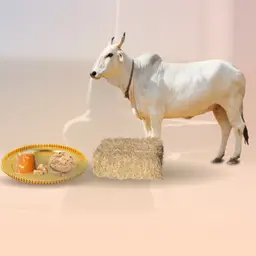
Description
In Hinduism, acts of kindness toward animals—especially cows and bulls—are seen as sacred offerings to the divine. One such spiritually enriching ritual is to feed 2 rotis, jaggery, and dry fodder to 1 Nandi Maharaj, the divine bull and faithful vahana (vehicle) of Lord Shiva.
This seemingly simple act holds deep symbolic meaning and spiritual merit, believed to remove obstacles, attract blessings, and bring peace and prosperity. Whether performed at a Shiva temple, gaushala (cow shelter), or in a rural setting, this ritual is considered a powerful act of devotion (bhakti) and karma purification.
Who is Nandi Maharaj?
Nandi Maharaj is the sacred bull who sits faithfully in front of every Shiva temple, gazing at his Lord with unwavering devotion. As Shiva’s chief attendant and gatekeeper, Nandi is also believed to carry the prayers of devotees directly to Mahadev.
Offering food to Nandi is a way to express gratitude and receive blessings in return.
Why Feed Rotis, Jaggery, and Dry Fodder?
Each item has spiritual and symbolic importance:
-
Roti (Chapati): Made from wheat, it represents simplicity, nourishment, and your hard work.
-
Jaggery (Gur): Signifies sweetness, love, and prosperity.
-
Dry Fodder: Represents traditional, sustainable nourishment for bulls. Also reflects care, respect, and service.
Together, they form a complete, meaningful offering of sustenance, sweetness, and spiritual balance.
The Spiritual Benefits of This Seva (Service)
Feeding 2 rotis, jaggery, and dry fodder to Nandi Maharaj is said to bring:
Removal of life obstacles
Peace of mind and emotional healing
Blessings for career growth and financial stability
Help with marriage-related or relationship issues
Positive energy in the home
Protection from negative karma
Divine connection with Lord Shiva
Scriptural Connection
The Shiva Purana and several other Vedic texts emphasize the importance of caring for nandi and gau vansh (cow lineage). Bulls like Nandi are associated with dharma (righteousness) and stability. Feeding them is equivalent to performing yagna, charity, and mantra japa combined.
Step-by-Step: How to Feed 1 Nandi Maharaj
What You’ll Need:
-
2 Rotis (freshly made, no salt or spices)
-
50–100 grams of jaggery
-
Dry fodder (hay, straw, dry grass, or sugarcane leaves)
-
Fresh clean water
-
Optional: Flowers, turmeric, incense
Step 1: Prepare with Bhakti
-
Wake up early and prepare 2 rotis.
-
Keep your heart calm and prayerful while making them.
-
Break jaggery into small pieces and keep dry fodder ready.
Step 2: Visit a Nandi
You can perform this ritual:
-
At a Shiva temple with a symbolic Nandi idol
-
At a cow shelter (gaushala) with a real bull
-
In your village or farm, if you care for bulls
Step 3: Offer With Prayer
Say a small prayer or chant:
"Om Namah Shivaya"
"Nandi Devaya Namah"
Gently offer the rotis, jaggery, and dry fodder. If you are feeding a real bull, place the food near it respectfully. If symbolic, place it at the idol's feet.
Step 4: Ensure Water is Nearby
If feeding a real Nandi, offer a bowl of fresh water as well. Bulls need hydration, especially in warm weather.
Step 5: Bow Down and Thank Nandi
Fold your hands, close your eyes, and express gratitude. Ask Nandi Maharaj to convey your prayers to Lord Shiva.
Best Days to Perform This Ritual
While this ritual can be done any day, it is especially powerful on:
-
Mondays (Somvar) – Day of Lord Shiva
-
Pradosh Vrat – Bi-monthly Shiva fast day
-
Mahashivratri – Annual night dedicated to Shiva
-
Full Moon (Purnima) – Strong spiritual vibrations
Tip: Many devotees perform this seva for 11 consecutive Mondays to fulfill a wish or resolve a specific problem.
Real-World Impact & Karma Yoga
This ritual is not only spiritual but also supports:
-
Animal welfare – Helping feed bulls and cows
-
Community seva – Supporting gaushalas
-
Eco-conscious giving – Sustainable offerings over wasteful materials
-
Compassionate action – A key pillar in Hindu dharma
Who Can Do This?
Anyone. Whether you are:
-
A student seeking career guidance
-
A woman praying for marriage or motherhood
-
A businessman facing obstacles
-
A spiritual seeker wanting peace
This ritual is open to all castes, ages, and genders, with no complex rituals required — just sincerity.


